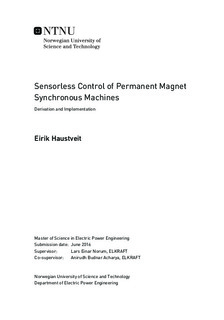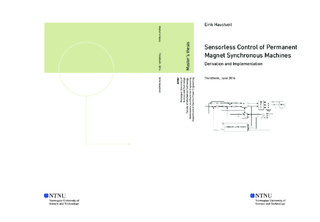| dc.description.abstract | This master project is a further investigation of the topics covered in the specializa-
tion project Laboratory platform for PM machine drive study - Adaptive Torque
Estimation .
Permanent magnet synchronous machines have seen an increased popularity in
recent years. Some market analyses indicate that the industry is experiencing a
gradual shift from induction machines to permanent magnet machines. The ma-
chine offer several advantages over the inductions machine. The rotor losses are
minimal, as there is no excitation current in the rotor. Thus the overall efficiency
is improved. The machine offers higher torque density, lower weight, and higher
torquetoinertiaratio,whichmayimprovethedynamicperformance. Althoughthe
permanentmagnetmaterialsareexpensive,thelowoverallmaterialusagesuggests
lower production costs.
In order to obtain the aforementioned advantages a power electronic converter is
required to control the machine. Although many of the induction machines found
in industry are supplied by direct grid connection, the cost savings associated with
the increased efficiency of applying a motor drive is changing this trend. Thus the
requirement of a motor drive should no longer be considered a disadvantage of the
synchronous machine alone.
A lot of research effort has been put into developing control algorithms for electri-
cal machines. In many cases the induction machine has been the initial study case,
and later on the algorithms have been adapted to suit different machines.
In order to accurately evaluate the performance of various motor control algo-
rithms, a laboratory platform of a permanent magnet synchronous motor drive has
been designed in this project. Several practical aspect regarding cooling require-
ments, safety functions, gate driver design, controller and measurement interface
have been considered. The platform is also intended as a base for future research
and development.
Three different control algorithms, field oriented control, direct torque control,
and model predictive control have been evaluated. Additionally different modula-
tion techniques for the inverter switches are covered. Theoretical derivations and
practical implementation is considered. The operation is evaluated by simulation
and laboratory experiments.
Regardless of which motor control algorithm is selected, knowledge of the rotor
flux position is required for efficient closed loop control. The use of position sen-
sors on the motor shaft increases the cost of the drive, and reduces the reliability.
In order to address this issue, several position estimation algorithms for sensorless
control have been evaluated. | |

